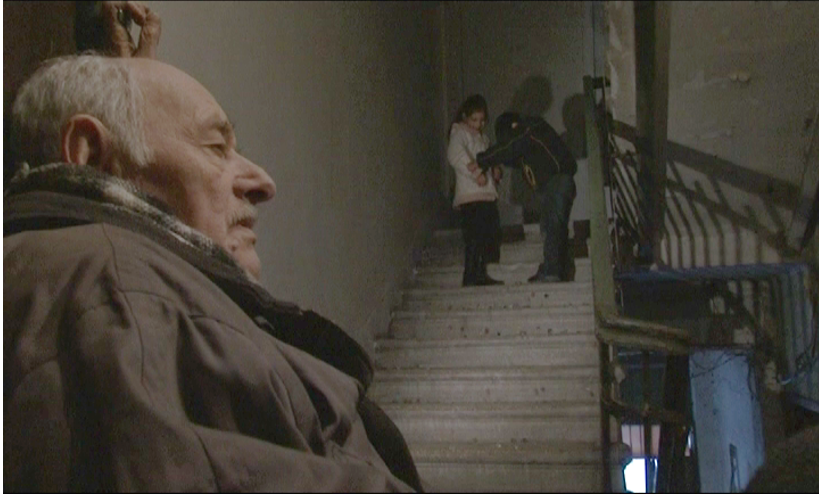A person, who is a victim of loneliness and inner emptiness often becomes a prisoner of himself, erects artificial barriers around himself and consciously or unconsciously alienates everyone and everything in order to protect the subconscious from potential danger. Nevertheless, such individuals are in dire need of self-healing and often receive help from where they least expect it. This problem of existentialism has been the focus of humanity's attention for many centuries and is the cause of a lot of mental pain and agony. It is not surprising that art has not bypassed this topic and has even expanded it so much that it has formed numerous trends in all fields, starting from classical romanticism and ending with deep philosophical expressionism. Naturally, cinema was no exception, and over the years, human loneliness and the search for true love have become one of the leading directions in the field.
This issue is the subject of Mariam Pertia's student film, "One Ticket to Nice" (2013), based on Tekla Iordanishvili's novel, "Two Tickets to Nice." To a large extent, this is a rather bold move because not only is film adaptation a difficult task for a young director but the literary value of the original source itself has become a rather controversial issue. The film saw the light of day but, unfortunately, it failed to meet its goal. The film did not work as the audience would have liked or as the director might have imagined. The project was doomed from the very beginning due to the fact that the original source is difficult to adapt for film since almost the entire work consists of dialogues and there are few elements of action description, which obliges the director to reveal his own vision. The main problem that the work has is its linearity. The film seems to be trying to address a really pressing issue but the overall plot is so drawn out and monotonous that it fails to keep the viewer's attention. Most of the dialogues are meaningless and do not develop the plot in any way, while some scenes, on the contrary, are very accelerated and events develop unnaturally quickly which gives the audience a feeling of fakeness. As for the acting skills, we cannot say that the actors do not fit the roles. There is good conversational style and facial expressions, but again and again, due to the poorly written script and dialogues, their acting seems fake.
The biggest flaws are found in the technical part. It is easy to notice even with the bare eye the unforgivable mistakes made in the audio and visual editing. There are so many flaws at various moments that it is impossible not to notice the sound, which is completely out of sync with the image. Especially in the scene where the main character of the film, a girl (Anna Amilakhvari) is talking on the phone in the office. The sound is heard too sharply and completely covers the background, which breaks the illusion of integrity between the shots.
When evaluating the cinematography, it should be noted that the image quality itself is pleasant, the color combination is good, there are a variety of close, medium and long views, but the frame of the shot often shakes almost throughout the entire film, the characters momentarily miss the field of view of the lens, which makes watching unpleasant and very tiring.
The plot problems in the film are partly the fault of the original source because the director does not deviate from the original plot for a second throughout the entire film, does not try to reveal creativity and breathe new life into the story. Therefore, all the disadvantages that the film's plot has are disadvantages of the novel.
The film tells the story of a girl who meets a young man (Lasha Djukharashvili) in a hotel, and gradually two strangers become entangled in a whirlwind of love. A very banal and simple story does not offer the viewer anything that they have not seen before and more than once. Due to a lot of worn-out phrases, long-outdated cinematic techniques and, simply, a boring shooting location, the film fails to establish proper contact with the viewer.
This film also has its positive sides in itself. For example, its musical accompaniment, which plays an important role in maintaining the atmosphere. Electronic music, which often and gradually turns into jazz, emphasizes the main character’s character and lifestyle and, creates a characteristic situation for the environment to some extent although the music lasts too long and is heard where it is not needed.
The main topic, which concerns a person’s inner world and finding the only true love in life, is generally a very difficult and serious problem. Humanity has always had and will have a need for true love. All this is due to the fact that there is no person who has not fallen in love and conflict with himself at least once in his life, because “if there is any treasure and reward that God has given to man, it is the gift of love, and it is a sin for a man to leave this world without experiencing this great gift.”
It is very difficult to revive such a topic that has been developed many times in such a way as to show the audience something new, something that they have not seen before. Such works are almost always monotonous and not what was conceived. Unfortunately, “One Ticket to Nice” is no exception.
Nika Sivsivadze






